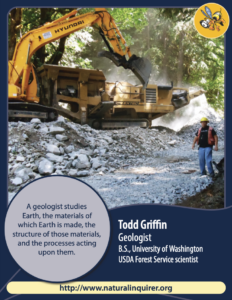Explore & Download All Collector Cards
Browse our ever-growing list of collector cards featuring a huge variety of careers in the Forest Service. Download and print collector cards and posters for free.

-

 Forests & PlantsLandforms
Forests & PlantsLandformsJenna Padilla, Geologist

- B.S., University of New Mexico
- USDA Forest Service Scientist
- A geologist for the Forest Service conducts studies and investigations on projects where minerals and geology impact the development or management of the forest resources (e.g., trees, range land, soil, water systems, wildlife). Geologists also manage material projects that are conducted on public lands and mitigate Abandoned Mine Land features.
- B.S., University of New Mexico
- USDA Forest Service Scientist
- A geologist for the Forest Service conducts studies and investigations on projects where minerals and geology impact the development or management of the forest resources (e.g., trees, range land, soil, water systems, wildlife). Geologists also manage material projects that are conducted on public lands and mitigate Abandoned Mine Land features.
-

 Landforms
LandformsJoanna Kovarik, Geologist & Speleologist

- Ph.D., University of South Florida
- USDA Forest Service Scientist
- A speleologist is a scientist who studies caves and the environments in which caves occur. Speleologists come from a diversity of educational backgrounds. My background is hydrogeology and geography.
- Ph.D., University of South Florida
- USDA Forest Service Scientist
- A speleologist is a scientist who studies caves and the environments in which caves occur. Speleologists come from a diversity of educational backgrounds. My background is hydrogeology and geography.
-

 LandformsMapping
LandformsMappingSabry Hanna, Geologist

- Ph.D., Cairo Univeristy (Egypt)
- USDA Forest Service Scientist
- Geology is the study of Earth, the materials of which it is made, the structure of those materials, and the processes acting upon them. An important part of geology is the study of how Earth’s materials, structures, processes and organisms have changed over time.
- Ph.D., Cairo Univeristy (Egypt)
- USDA Forest Service Scientist
- Geology is the study of Earth, the materials of which it is made, the structure of those materials, and the processes acting upon them. An important part of geology is the study of how Earth’s materials, structures, processes and organisms have changed over time.
-

 Landforms
LandformsTodd Griffin, Geologist

- B.S., University of Washington
- USDA Forest Service Scientist
- A geologist studies Earth, the materials Earth is made, the structure of those materials, and the processes acting upon them.
- B.S., University of Washington
- USDA Forest Service Scientist
- A geologist studies Earth, the materials Earth is made, the structure of those materials, and the processes acting upon them.
-

 LandformsWildlife
LandformsWildlifeMichael Fracasso, Paleontologist & Geologist

- Ph.D., Yale University
- USDA Forest Service Scientist
- Paleontologists study fossils, and the rocks in which fossils occur, to understand how ancient organisms lived. This focus enables paleontologists to document and interpret the history of life on Earth.
- Ph.D., Yale University
- USDA Forest Service Scientist
- Paleontologists study fossils, and the rocks in which fossils occur, to understand how ancient organisms lived. This focus enables paleontologists to document and interpret the history of life on Earth.
-

 Forests & PlantsLandformsWildlife
Forests & PlantsLandformsWildlifeBarb Beasley, Paleontologist

- M.S., Fort Hays State University
- USDA Forest Service Scientist
- As a paleontologist, I study plants and animals that are preserved in the earth. Essentially, I am a prehistoric wildlife biologist.
- M.S., Fort Hays State University
- USDA Forest Service Scientist
- As a paleontologist, I study plants and animals that are preserved in the earth. Essentially, I am a prehistoric wildlife biologist.
-

 WaterWildlife
WaterWildlifeSusie Adams, Aquatic Ecologist & Astacologist

- Ph.D., The University of Montana
- USDA Forest Service Scientist
- An aquatic ecologist studies interactions in aquatic ecosystems, and an astacologist studies crayfish. I often focus on interactions involving fish and crayfish.
- Ph.D., The University of Montana
- USDA Forest Service Scientist
- An aquatic ecologist studies interactions in aquatic ecosystems, and an astacologist studies crayfish. I often focus on interactions involving fish and crayfish.
-

 Insects
InsectsAmy Hill, Forest Entomologist

- M.S., West Virginia University
- USDA Forest Service Scientist
- As a forest entomologist, I study how native trees interact with feeding from invasive insects from other countries.
- M.S., West Virginia University
- USDA Forest Service Scientist
- As a forest entomologist, I study how native trees interact with feeding from invasive insects from other countries.
-

 Forests & PlantsInsectsWildlife
Forests & PlantsInsectsWildlifeFrank Koch, Invasion Ecologist

- Ph.D., NC State University
- USDA Forest Service Scientist
- An invasion ecologist studies the ways in which species move out of their native environments and into new ones, where they sometimes have negative impacts.
- Ph.D., NC State University
- USDA Forest Service Scientist
- An invasion ecologist studies the ways in which species move out of their native environments and into new ones, where they sometimes have negative impacts.
-

 Forests & Plants
Forests & PlantsSusan Best, Plant Pathologist

- M.S., Iowa State University
- USDA Forest Service Scientist
- A plant pathologist specializes in plant health. Keeping plants healthy requires an understanding of the organisms that cause disease, as well as an undertanding of how plants grow and are affected by disease.
- M.S., Iowa State University
- USDA Forest Service Scientist
- A plant pathologist specializes in plant health. Keeping plants healthy requires an understanding of the organisms that cause disease, as well as an undertanding of how plants grow and are affected by disease.























